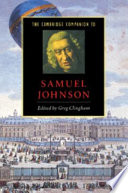 A quibble is the golden apple for which he will always turn aside from his career, or stoop from his elevation. A quibble, poor and barren as it is, gave him such delight, that he was content to purchase it, by the sacrifice of reason, propriety and truth.... A quibble is the golden apple for which he will always turn aside from his career, or stoop from his elevation. A quibble, poor and barren as it is, gave him such delight, that he was content to purchase it, by the sacrifice of reason, propriety and truth....  Blackwood's Edinburgh Magazine - Page 2101856Full view Blackwood's Edinburgh Magazine - Page 2101856Full view - About this book
 | Mihoko Suzuki - 1989 - 292 pages
...such delight, that he was content to purchase it, by the sacrifice of reason, propriety and truth. A quibble was to him the fatal Cleopatra for which he lost the world, and was content to lose it. — Samuel Johnson, "Preface to Shakespeare" Just as Euripides' story of faithful Helen's sojourn in... | |
 | Russ McDonald - 1994 - 324 pages
...For example, take Samuel Johnson, whose famous criticism of Shakespeare's wordplay is often quoted: "A quibble was to him the fatal Cleopatra for which he lost the world, and was content to lose it."11 Cleopatra, that occult agent of femininity who stretches the boundaries of passion and discourse,... | |
 | Jean I. Marsden - 1995 - 214 pages
...him such delight that he was content to purchase it, by the sacrifice of reason, propriety and truth. A quibble was to him the fatal Cleopatra for which he lost the world, and was content to lose it. [74] In this passage, frequently cited by Johnson's contemporaries, we see the firm decisiveness absent... | |
 | Brian Vickers - 1995 - 585 pages
...Mind wholly occupied by some quibbling Scenes in Romeo and Juliet, and the Midsummer's Night's Dream! 'A Quibble was to him the fatal Cleopatra for which he lost the World, and was content to lose it.' [p. 68] Has not Mr. J. been as culpably fond of writing upon Quibble, as Shakespeare in pursuing it?... | |
 | Shirley Nelson Garner, Madelon Sprengnether - 1996 - 346 pages
...Shakespeare, Samuel Johnson ranked among Shakespeare's faults his susceptibility to "the quibble": "A quibble was to him the fatal Cleopatra for which he lost the World and was content to lose it" (Johnson, in Kermode 89). While Johnson introduces Cleopatra here simply as a local metaphor for what... | |
 | D. C. Greetham, W. Speed Hill, Peter Shillingsburg - 1996 - 528 pages
...Soseki scholars had hardly ever pointed out. As Dr. Samuel Johnson wrote, "A quibble was to Shakespeare the fatal Cleopatra for which he lost the world and was content to lose it"; I suggest that Shakespeare might be replaced with Soseki in this context. (Soseki was indeed a punster.)... | |
 | Greg Clingham - 1997 - 290 pages
...beyond the point where it warranted praise hence the indulgence in quibbles, or "fatal Cleopatra[s] for which he lost the world, and was content to lose it" (p. 74). Johnson praises comedy, and he criticizes tragedy. But the scene, not the play, is the unit... | |
 | Robert S. Miola - 2000 - 206 pages
...him such delight that he was content to purchase it by the sacrifice of reason, propriety, and truth. A quibble was to him the fatal Cleopatra for which he lost the world, and was content to lose it. (Vickers, v. 68) Today Shakespeare's quibbles, often cut in production, may seem trivial and tedious;... | |
 | Richard M. Hogg, Norman Francis Blake, Roger Lass, R. W. Burchfield - 1992 - 812 pages
...clenches' (1 672; in Watson 1962: I 178-9) or Dr Johnson, a century later, censures Shakespeare, because 'a quibble was to him the fatal Cleopatra for which he lost the world, and was content to lose it' (1765: 23-4). In lamenting Milton's propensity to pun, Addison portrays it as the vice of an age now... | |
 | William Shakespeare - 2000 - 424 pages
...Preface, 'has some malignant power over [Shakespeare's] mind, and its fascinations are irresistible. It was to him the fatal Cleopatra, for which he lost the world and was content to lose it.' — ED. 29. past care, etc.] MALONE : ' Things past redress are now with me past care.' — Rich. II:... | |
| |